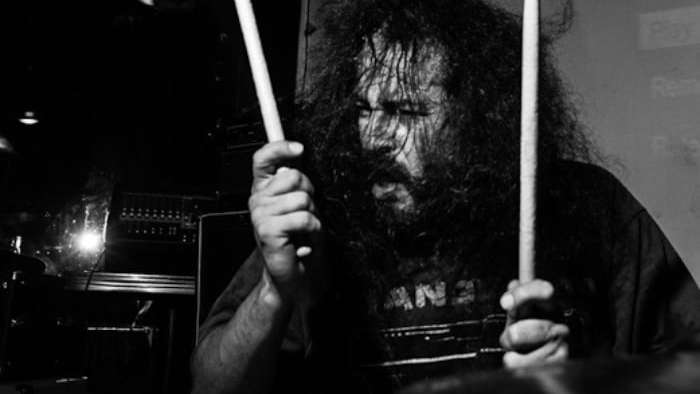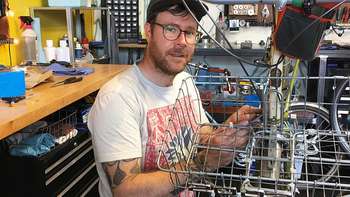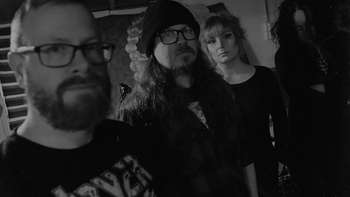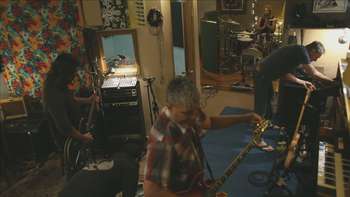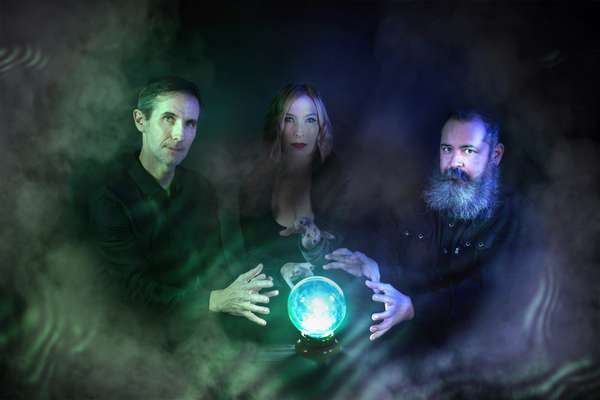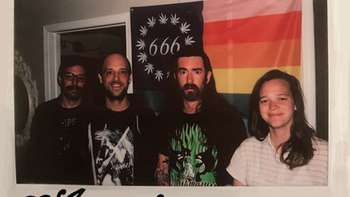There are a lot of misconceptions about the life of a musician. And, frankly, it’s rarely glamorous. Most musicians have day jobs – and not just to pay the bills. Jobs provide new challenges, personal fulfillment and, yes, some rent or gas money. And usually when somebody is writing a new record or scheduling a tour, they have to balance that with their job.
How an artist spends their time by day will influence the creative process at night. In Don’t Quit Your Day Job, Scene Point Blank looks at how musicians split their time, and how their careers influence their music or – sometimes – how their music provides escape.
In this edition, we chat with Sal Gallegos, drummer of Secret Fun Club by night and systems analyst by day.
Scene Point Blank: First, can you share a bit about your job title(s) and background? You work IT, which is tech-heavy, but in health care, which has a million unique regulations too.
Sal Gallegos: My job title is systems analyst three. I started out as a system analyst one but eventually worked my way up to three, which is the top tier. I work in IT helping to support applications that not only physicians and nurses use, but also administration and finance departments as well.
Scene Point Blank: I imagine career-wise, you pursued IT and health care happens to be where you found work? Or did you focus on this industry?
Sal Gallegos: I actually did not pursue a career in IT per se. I had worked a lot of jobs that didn’t necessarily pay great but allowed me to tour when needed for years. While I was in a band that toured a lot I was also in school and got my bachelors degree in history. After all the touring slowed down I decided I wanted to do things like buy a house and pretend to be a responsible adult. Ha ha! I randomly applied for the job in healthcare IT [and] I was able to get in on the ground level. Eventually I learned more skills and I was able to work my way up the ladder a bit.
Scene Point Blank: Is health care IT work comparable to other industries, or do the regulations make it a niche career path?
Sal Gallegos: Health care IT is pretty comparable to IT in other industries. There are certain regulations that you would have to be cautious of as far as not divulging any specific patient information, but other than that there’s not a whole lot of difference. It’s mainly just getting applications to work with each other and with medical devices. Then fixing them if anything goes wrong.
Scene Point Blank: When did you first become serious about being a musician and, in comparison, when did you become interested in IT or tech? In other words, do they overlap and was one before the other?
Sal Gallegos: I was serious about playing music pretty much as soon as I first started which was around 17-18 years of age. IT is just some thing I sort of fell into to make ends meet. I was at a point in life where I was applying for any job that I thought I would remotely be qualified for, and somehow was able to BS my way into leading a job in IT.
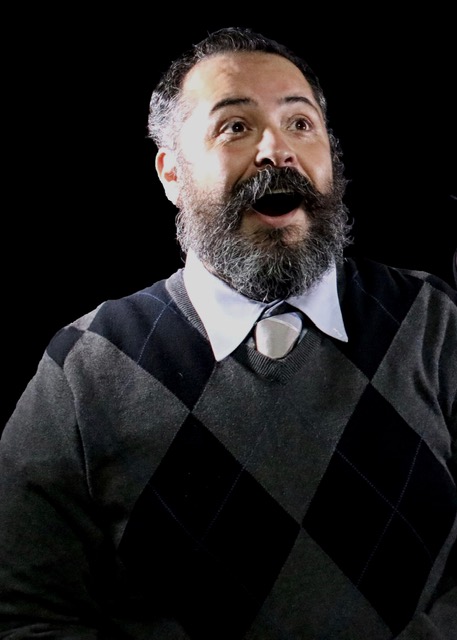
Scene Point Blank: Did playing in bands influence your education or career timeline?
Sal Gallegos: Yeah it did, I was in college for a few years when we were touring a lot so that meant I wasn’t able to take as many classes as I wanted to. I was fortunate enough that by the time we really got busy touring I knew a couple of my professors and was somehow able to talk them into letting me turn in my work and participate in class from the road.
One of the last tours we did when I was in school I had a giant backpack full of books and my laptop. I wrote a 35-page paper and a 43-page paper during that tour, as well as a handful of 6 to 10 page papers, Ha ha!
Scene Point Blank: How did the pandemic influence your work over the past year? Is it improving?
Sal Gallegos: Obviously working in health care, the pandemic has made my job a lot busier than before. Not just with the overcrowding in the hospitals and clinics, but with a lot of the administration staff going home and having to teach them how to work from home. Also, I ended up being sent to work from home as opposed to the office. I love it: no more traffic and I get to hang out with my dog while working all day.
Scene Point Blank: Do you think this will be a permanent change, at least in some form – and is it fairly standard to the industry nowadays?
Sal Gallegos: Yes, I absolutely see remote working as becoming a normal part of the job. I read [it] all the time: so many different jobs and industries are moving to remote work. I’ve also read where a few Asian and European countries are starting to experiment with four day work weeks. I definitely can see both of them becoming common place.
I’ve been working remote for about two years and have not experienced any hinderance in performing my job.
Scene Point Blank: Does your music ever come up on the job?
Sal Gallegos: Absolutely not, I try to keep my life as a musician as down low as possible. I think most of my coworkers would not get it [and] just think that I am super weird, Ha ha!
Scene Point Blank: Has your making music affected your ability to get a job -- questions about availability or concerns that your career might come "second" to music, or something?
Sal Gallegos: Yeah, I would definitely say music affected my ability in the past to get jobs or to even seek out jobs. For many years I worked record store retail jobs because either friends were managers or they were just the kind of jobs I knew I could leave for a couple months and come back to. At a point I kind of had to make a decision on whether or not I was going to make a decent living at a “real job” or continue touring and having the craziest adventures ever. I do miss touring a lot, but I still play music 3 to 5 nights a week so I am definitely not missing out on playing music.
Scene Point Blank: You're on call regularly, meaning you may have to drop whatever you're doing on your personal time and resolve a work issue. How does the job affect your creative work or schedule?
Sal Gallegos: I’ve kind of had to adjust some things once I started doing on call rotations. Pretty much, I just plan on staying home the entire week I am on call. I take my dog for walks and, every once in a while, I’ll sneak in a trip to the gym but other than that I pretty much try to stay around my house near my computer because things break all the time so I never know when I will get a call to fix something.
My bands have adjusted though, usually we take the weeks that I am on call to write. We will constantly be texting and emailing video and audio of parts that we have been working on and we will sort of structure new things so that way when practice does resume we will have new stuff to work on. I’m lucky in the fact that none of my musical projects stay idle for very long.
"I love working from home: no more traffic and I get to hang out with my dog while working all day."
Scene Point Blank: How does the job affect your music? Do you have to tour at a certain time of year to fit with your "day job schedule" or does it affect how you write, rehearse or record?
Sal Gallegos: Obviously with my schedule even a short tour takes a lot of planning ahead of time.
Practicing and recording: not so much. We usually just have to schedule around the weeks I’m on call. I wised up a few years ago and invested in recording equipment so I basically have a fully functional studio inside the practice space so scheduling recordings is a lot easier.
Scene Point Blank: Has your work influenced any specific songs you've released?
Sal Gallegos: Not really, I think I do a pretty good job of separating work life and my musical life. I try not to think let things like work stress interfere with band practice or song writing. I feel pretty lucky that after almost 30 years of playing music I am still so excited and enthusiastic to play that outside stress just disappears once I get behind my drum set.
Scene Point Blank: What advice would you give to others who might be interested in IT work (health care or other) but don't know where to start?
Sal Gallegos: Honestly it sounds kind of silly but a good place to start would be an IT trade school. Get all your certifications like A+, network plus, security plus, and any kind of cloud certificates offered (which I still don’t have), Ha ha!
Scene Point Blank: Anything you'd like to add?
Sal Gallegos: Thanks for reaching out, as I said I try to do a good job of separating music and work so this was really one of the first times I had to think in terms of how one affects the other. It was kind of an interesting self analysis.
--
Check out previous entries in the Don’t Quit Your Day Job series, including discussions on teaching, health care, stunt work, and more.
